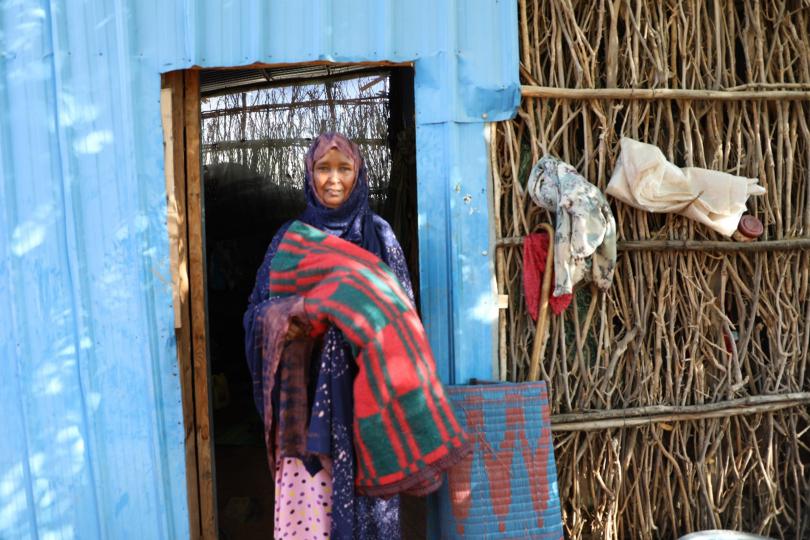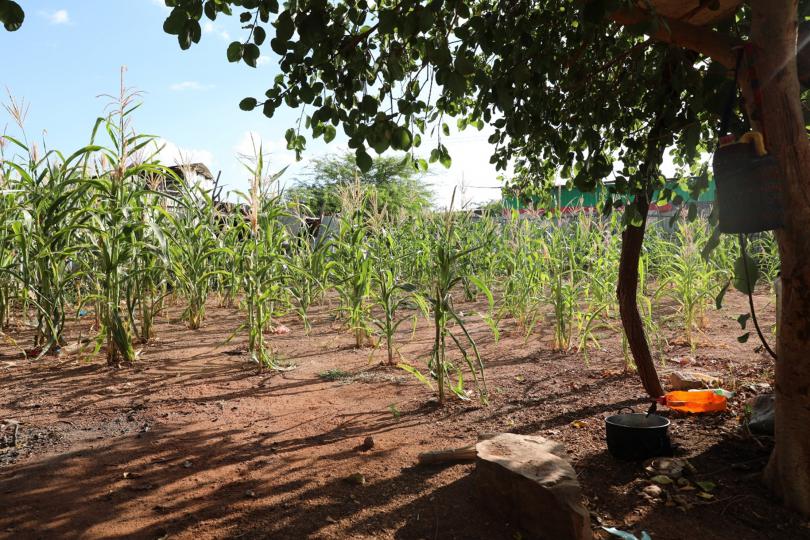Rebuilding Lives: Iadan’s Story of Survival and Recovery in Dollo Ado

Story summary:
Iadan, 55, is a mother of seven who lives, Dollo Ado town in Liban zone nestled in Somali region, sharing a small house and a big heart with her seven children. Iadan's household is one of the thousands of houses hold who were affected by the recent flooding in Dollo Ado.
Iadan and her family had to move to a nearby school when floodwaters engulfed their home. They stayed there as internally displaced people (IDPs) for two months until the waters subsided. All that they had were destroyed by the unexpected flood, and the waters severely damaged their homes and restroom facilities.
With the help of the SWAN rapid response program, Save the Children provided NFI materials to Iadan and other similarly displaced families. Save the Children's humanitarian response in Dolo Ado Town was made possible for the people affected by the flood by the SWAN consortium's rapid response mechanism funded by EHF-OCHA, which was instrumental in enhancing the lives of the displaced families.
The El Niño-induced floods during the Deyr/Hageya (October to December) rain season have affected approximately 1.5 million people in the south and southeastern parts of Ethiopia, including Somali, South Ethiopia, Southwest Ethiopia, and Oromia regions.
Iadan's story in her own words (Quotes):
"My name is Iadan, and I reside in Dollo Ado with my husband and our seven children. Our family's sustenance relies heavily on my husband's income as a daily laborer. Each day's outcome significantly impacts our survival; sometimes we have enough, while other times we struggle to make ends meet."
"During the devastating flood that surrounded our neighborhood and breached our home, I ensured the safety of all my children. We sought refuge in a secure location, where we weathered the flooding together."
"Our initial days in the temporary shelter were incredibly challenging. We possessed nothing, but eventually, aid arrived. Among the assistance provided was Save the Children's Non-Food Item (NFI) kits, which included essentials like mattresses, blankets, and cooking materials. These items alleviated some of the hardships me and my children faced."
"Now that we have returned to our home, Allah knows the situation remains precarious. The water damage has left us with significant losses, and rebuilding our lives feels like an uphill battle. Day by day, we rely on whatever daily work we can find. Additionally, we've turned the flooding crisis into an opportunity by planting maize in our compound a hopeful step toward a future source of income."
"I express profound gratitude for the support we received during this difficult time. It enabled my family to meet our basic needs while we were displaced."
How Save the Children is helping:
>On November 4, 2023, the Somali Regional State Disaster Risk Management Bureau (DRMB) reported the grim aftermath of heavy rainfall and flooding, documenting extensive damage and mass displacement. The report unveiled a distressing toll: 24 woredas and 74 sites affected, 36,311 households impacted, 17,268 households displaced, 23 lives lost, 9,405 hectares of crops ravaged, and 3,636 livestock perished due to the El Niño-induced floods during the deyr/hageya (October to December) rain season.
Save the Children has been provided lifesaving integrated multi-sectoral approaches address the existing identified gaps and priority needs of affected communities. The prepositioning of essential supplies such as life saving WASH NFIs, water treatment chemicals to address the pressing need for clean water amid the flood. This foresighted approach facilitated rapid distribution, ensuring that affected communities had access to safe drinking water during this critical time. The delivery of cash assistance through programs like BHA and AICS specifically for the flood period, with distribution slated for the imminent days.
Background / Project information
SWAN is a consortium funded by EHF-OCHA that includes Save the Children (lead agency), World Vision, the Norwegian Refugee Council, and Action Against Hunger. SWAN RRM projects' overarching goals are to help save lives, alleviate suffering, and advance human dignity for those impacted by displacement, including host communities throughout Ethiopia.
SWAN consortium project has been providing lifesaving integrated multi-sectoral WASH, NFIS and Emergency Shelter, Protection and Health assistance and is delivering a flexible rapid humanitarian response mechanism to communities across Ethiopia affected by drought, flood conflict, disease outbreaks, and other humanitarian situations through effective rapid humanitarian support through in integrated multisectoral response in coordination with local partners, cluster coordination and actors.
The SWAN consortium is dedicated to addressing the challenges observed within the humanitarian supply pipeline system. They aim to achieve this by leveraging existing humanitarian platforms and focusing on flexible, faster, and proactive assessments and decision-making.
The ultimate goal is to achieve faster procurement lead times, efficient delivery, and prepositioning of supplies such as medical equipment and kits, WASH, and Shelter NFIs. This will help address critical gaps by providing urgent and direct response to crises in a coordinated, timely, and principled manner through prepositioning resources. The SWAN consortium through its multi sectoral and rapid response reached 43,363 people (22,549 Children) in Dollo Ado town of Liban zone with distribution of NFIs, Supplies and replacement of old flood affected generators and pump for the town's water, energy office and health a center in responding to the most recent flooding in the area.






